- Home
- Dan Simmons
Hardcase Page 10
Hardcase Read online
Page 10
"What is your question, Mr. Kurtz?"
"I'd like to know what you had to do with the charge being dropped."
O'Toole tapped her lower lip with the stem of her glasses. "Why do you think I had something to do with the charges being dropped?"
"Because I think Hathaway… the homicide cop who dragged me out of here…"
"I know Detective Hathaway," said O'Toole. There was the slightest hint of revulsion in her tone.
"… I think he would have gone ahead with the illegal-carry parole-violation charge," finished Kurtz. "During the interrogation at the city jail, he showed me a throwdown he was ready to plant on me, and I know that he wants me in County for his own reasons."
"I don't know about any of that," O'Toole said curtly. "But I did check into your arraignment"—she hesitated a few seconds—"and I did let the district attorney know that I was present during your arrest and watched the detectives frisk you. You weren't armed when they arrested you."
"You told the D.A. that?" said Kurtz, amazed. When O'Toole said nothing more, he said, "What if Hathaway testified that I had an ankle holster or something?"
"I watched them frisk you," she said coolly. "There was no ankle holster."
Kurtz shook his head, truly surprised. He had never heard of a cop going out of his or her way to keep another cop from railroading someone.
"Can we get back to your interview?" she asked.
"Sure."
"Someone answered the phone number you gave me and identified herself as your secretary…"
"Arlene," said Kurtz.
"… but anyone can claim to be anyone on the phone," finished O'Toole. "I'd like to visit your business office. Did I say something amusing, Mr. Kurtz?"
"Not at all, Officer O'Toole." He gave her the address. "If you call ahead, Arlene will let you in the back way. It might be preferable to coming in the front."
"And why is that?" Her tone was suspicious.
Kurtz told her.
This time it was the P.O. who smiled. "I worked Vice for three years, Mr. Kurtz. I can probably take a transit through a porno shop."
Kurtz was surprised for the second time. He didn't know of many parole officers who had been real cops.
"I saw you on the Channel Seven WKBW Eyewitness News yesterday evening," she said and waited.
Kurtz also waited.
"Is there any special reason," she said at last, "that you happened to be at the site where a truck had gone into the gorge the night before?"
"Just rubbernecking," said Kurtz. "I was driving along the expressway up there, saw the TV trucks, and pulled into the turnout to see what all the commotion was."
O'Toole made a note on her pad. "Were you on the American side or the Canadian side?" Her tone was casual.
Kurtz actually grinned. "If it had been the Canadian side, Parole Officer O'Toole, I would have been in violation of my parole, and you'd be sending me to County within the hour. No, I think you could tell from the angle that they were shooting video from the American side. I guess they couldn't get a clear shot from where the truck actually went over."
O'Toole made another note. "You seemed almost eager to be seen in the cutaway shots to the crowd," she said.
Kurtz shrugged. "Isn't everyone eager to get on TV?"
"I don't think you are, Mr. Kurtz. At least, not unless you had a specific reason to be seen there."
Kurtz looked blandly at her and thought, Christ, I'm glad Hathaway isn't as smart as she is.
She checked something else off her list. "All right, about your place of residence. Are you settled yet?"
"Not really," said Kurtz, "but I'm getting closer to finding a permanent place to live."
"What are your plans?"
"Eventually," said Kurtz, "I'd like one of those big houses on the bluffs up toward Youngstown, not far from Fort Niagara."
O'Toole glanced at her watch and waited.
"In the immediate future," said Kurtz, "I'm hoping to find an apartment."
"Week after next," said O'Toole, putting down her pen and removing her glasses to let him know that the interview was over. "That's when I'll make the official visit."
* * *
CHAPTER 24
« ^ »
The Alabama Beagle Boys—back when there were five of them, there were only four living now—came by their name via an unfortunate photograph picked up by the wire services in the mid-1990s when an Alabama Department of Corrections official, exhilarated by his popular press after bringing back chain gangs, issued horizontally striped prison uniforms to all state inmates. The photographer from the Dothan, Alabama, newspaper had gone out to one of the prison-striped chain gangs working along State Highway 84 not far from the Boll Weevil Monument and photographed five men pulled from the work detail apparently at random.
It had not been random. It had amused the gang bull to line up five dim-witted brothers for the shot, the five overweight young men all serving three years for a completely botched Wal-Mart robbery in Dothan during which thirty-five legally armed Wal-Mart shoppers—the majority of them senior citizens—and the seventy-four-year-old "Wal-Mart Greeter," who had been carrying a .357 Magnum, all had drawn down on the boys, putting four of them in the hospital for gunshot wounds and sending all of them to the Babbie State Prison just outside of Opp. The five were known then just as the Beugel brothers—Warren, Darren, Douglas, Andrew, and Oliver—but a combination of a Dothan Journal misprint that went out to UPI and the comic image of the five in their striped coveralls changed their name forever to the Alabama Beagle Boys.
Six months after the photograph was taken, four of them escaped—Oliver, the youngest, had crawled back through the wire to rescue his pet crayfish and had been shot twenty-four times by guards. The first thing the Beagle Boys did after eluding the "Largest Manhunt in Southern Alabama History" was to visit the Department of Corrections' Chiefs farm outside of Montgomery, where they killed the man, burned down his house, raped his wife into a coma, and nailed the family's dog to the barn door (although those still in prison in the South maintain that it was the dog who was raped and the wife who was nailed to the barn door).
Warren, Darren, Douglas, and Andrew then headed for Canada but, stymied by the difficulty of crossing the border under the delusion that they needed passports, went to ground in Buffalo, where they became lay ministers and soldiers in the White Aryan Army of the Lord, headquartered in the suburb of West Seneca.
This night, at a warehouse near the State University of New York campus, they were shopping.
"Full auto with laser shit is what we want," said Warren, the oldest.
"Of course, of course," said Malcolm Kibunte, bowing the huge rednecks into the rear room of the cinder-block warehouse. "Full auto with laser shit it will be, then."
The Boys had been carefully and repeatedly frisked before being driven, blindfolded, to the warehouse site, where Doo-Rag and a dozen of his men watched carefully and a bit reproachfully. The Alabama Beagle Boys ignored the gangbangers.
"Holy shit," breathed Douglas, who, after Oliver, had always been the least brilliant of the five, "lookit here. Woowhee! Everythang we wanted, rat heah."
"Shut up, Douglas," Andrew said automatically.
Douglas was right, however. The long warehouse room was stacked with boxes of weapons and ammo. Laid out for inspection were AR-15s, M590A1 Pistol Grip mil-spec combat shotguns, Colt M4 full-auto carbines, combat-ready M-16s, compact machine guns such as HK UMP 45s and Israeli Bullpups, and sniper rifles such as Remington's model 700 Police DM Light Tactical.
All four of the Boys wanted to drool. Three of them resisted the impulse, but their small eyes were all alight. If the Boys saw any irony in buying weapons for the coming Race War Heralding Armageddon from black gang members, they did not show it. Of course, the Boys were not deeply into irony.
Darren was ogling a table filled with detachable sights: Aimpoint Red Dots, Bausch & Lomb 10 X 42 Police Tactical Scopes, U.S. Optics SN4 Specops Bat
tle Sights, Comp ML red dots, and others.
"Careful, Darren, my man," said Malcolm. "Your hard-on showing. Weaken your bargaining position, you cum on the hardware." Malcolm grinned broadly to show that it was all good humor between guys.
Darren blushed and turned his back.
Warren was mixing and matching elements into a perfect weapon: the Colt M4 carbine with a compact laser sight, topped off with a Suppressed Tactical Weapons suppressor made out of gold-colored titanium.
"Good choice," said Malcolm. "A handsome combination to take to Armageddon, that be God's truth."
Warren glared but said only, "How much?"
"For how many of which?" said Malcolm.
The Boys licked their lips, looking around in a palpable heat wave of greed, while Warren took a wrinkled sheet of yellow legal-pad paper from his hip pocket—the Boys were all wearing old army fatigue jackets, jump boots, and jeans now rather than their trademark stripes—and consulted his shopping list. He read from the list slowly, obviously adding a few things from the displays.
Malcolm raised his eyebrows and named a price.
The Boys looked at each other in near despair. With the money the White Aryan Army of the Lord had raised so far, they could not quite afford Warren's single carbine-scope-suppressor combination.
"Let us go outsad an' fahr a few of these-here guns," Andrew said craftily.
Malcolm just grinned while Doo-Rag clicked his Tek-9 to full-auto. "Not quite time for test fahring yet, my man," said Malcolm.
"Maybe it'd be time for the police to hear that some Buffalo niggers were the ones who knocked over the Dunkirk army arsenal this past August," said Warren.
"Maybe," Malcolm agreed with a grin. "But if there come even a rumor like that—and we'd hear it because the police wouldn't know where to find these niggers or their guns—then the poor old Chapel of the Good Ol' Boy Aryan Nation Crackers for Jesus gets itself visited by fifty-sixty of Doo-Rag's friends, and the Aryan Nation faithful get themselves shot into little greasy mini-Aryan chickenbits."
"White Aryan Army of the Lord," corrected Douglas.
"Shut up, Douglas," said Andrew.
There were a few moments of silence.
"There is a way that you can get a thirty percent discount on some of the things you want here," Malcolm said at last.
"How?" said Warren.
Malcolm wandered over, picked up a Carbon AR-15 .223, sighted through the Colt C-More red-dot sight, dry-fired the black weapon, and set it back. "There a dude that's going to die," he said. "He hiding out in a warehouse in the city. Not armed with nothing more than a pistol. Maybe not that. You take care of it for us, thirty percent off on whatever you carry in to do the job."
Warren squinted at Malcolm. "That don't make no sense." He looked around at the boxes upon boxes of weapons and then at Doo-Rag and his heavily armed friends.
Malcolm shrugged. "This dude a white boy. You know how sensitive we are these days about offing white boys."
"Bullshit," said Andrew.
"Shut up, Andrew," said Warren. To Malcolm, he said, "You want this guy wasted, why don't you just take him out on the street with one of those?" He nodded toward one of the scoped sniper rifles on display.
Malcolm made a gesture with his hands. "Agreed, be easy to do," he said. "But sometimes the Buffalo police take notice when you gun down citizens on their streets—you understand what I'm saying? Better let this white boy die and rot away in this old abandoned warehouse."
"Then why don't you go in after him yourselves?" said Warren.
Malcolm shrugged. "Doo-Rag and the others want to, but there always a chance that something might go wrong—we drop a weapon or something—and then the federal 'thorities got an idea who borrowed their army toys."
Warren grinned, showing southern Alabama's Department of Corrections' lack of investment in dental care. "But if we leave prints behind… or one of us left behind… it don't bother you-all."
"Not so much," Malcolm agreed.
"When do you want this done?" Darren asked.
"Real soon would be fine," said Malcolm. "You choose the pieces you want with the toys to go with them, we take you to where this dude is sleeping. Thirty percent off, you each get a piece for the price of that one you wanted. Plus all the laser shit you want. Plus some other good stuff…" Malcolm held up a heavy double-optic apparatus with nylon straps.
"What the shit is that?" said Darren.
"Shut up, Darren," said Warren. "What the shit is it?" he asked Malcolm.
Malcolm raised an eyebrow. "Ain't you never seen one of those movies where the terrorists or Navy SEALS or such wear this night-vision shit?"
"Oh, yeah," said Darren. "They just look different when they're not on someone's head is all."
"Shut up, Darren," said Warren. "Night-vision goggles?" he said to Malcolm.
"Correct, my man," said Malcolm. "These take the tiniest little bit of light—not even to notice, dark as a cave to the naked eyeball—and let you see like it was high noon. These goggles here probably led to a shitload of Iraqis going to Allah early."
Douglas whistled.
"Shut up, Douglas," Andrew said automatically.
"You said do this real soon," said Warren. "How soon is real soon?"
Malcolm checked his watch. It was almost 1:00 a.m. "Now be good," he said.
"And we just get to walk away from this place with the guns?" Warren asked.
Malcolm nodded.
"And you gonna give us bullets?" Darren asked.
Warren glared at his brother, but said nothing.
"Yes, Darren, my man, bullets thrown in for free before you go into the warehouse. We got clips of .223s, .45s, subsonic 5.56 millimeters for the Bullpup, .22s, 9 millimeters for some of the carbines, banana clips, 12-gauge shells for the shotguns, even some .308 Match for the sniper shit."
Malcolm lifted some brightly colored hand radios, gesturing like a salesman ready to close a deal. "And we even throw in these personal, multi-frequency portable radios with a two-mile range for free."
"Shit," said Darren. "Those are just kiddie toys."
Malcolm smiled and shrugged. "True, my man. But you understand why once we drop you off—with ammo clips and Kevlar vests as well as the guns—we don't want to wait around."
Warren screwed up his face, thinking about this. His silence suggested that he could find no fault in the logic.
"You can use the radios to talk to each other going in," said Malcolm. "Then call us when it all over."
Warren grunted. "How do we know when it's the right dude?"
Malcolm grinned. "Well, since this white boy the only person in the warehouse, just kill everybody in there, you probably be safe to assume," he said. "But this might help." He tossed Kurtz's mug shot onto the table covered with laser sights and night-vision goggles.
The Alabama Beagle Boys huddled around the table, staring down at the photograph, none of men touching it.
"Shall we do it?" said Malcolm, gesturing to the displays of weapons.
"We didn't bring cash," said Warren.
Malcolm smiled. "Your credit good with us. Besides, we know where your church is."
* * *
CHAPTER 25
« ^ »
The stupid shits came in the front door and now they're using the elevator. Probably trying to flush me—scare me into running downstairs.
Kurtz did not know who the stupid shits were, but he had rigged the front and rear doors of the warehouse with monofilament thread that ran up to his sixth-floor sleeping cubby, each thread ending in a soup can full of rocks, and his front-door can had rattled. Kurtz had been out of his sleeping bag in two seconds, had slipped into his shoes and leather gloves, had pulled his .45 and the short-barreled .38 from his duffel, and was out into the pitch-black hallway in ten seconds, crouching and waiting. The terrible noise of the freight elevator spoke for itself.
Kurtz had no night-vision goggles, but his eyes had long since adapted to the tiny b
it of cloud-reflected city light filtering down through holes in the ceiling and down the elevator shaft itself. Moving carefully around heaps of junk and puddles of water, he moved quickly to the open elevator shaft.
Usually, he knew, elevator doors were designed not to open if the elevator was not stopped on that level, but the construction boys had ripped off the wide doors to the freight elevator for reasons known only to God and themselves, marking the elevator shaft with only a ribbon of orange plastic tape stretched across the dark opening. Kurtz crouched by the tape and waited. The elevator could be a diversion. They could be coming up the stairways. From where he crouched, Kurtz could see the opening to the north stairwell.
Someone was talking in loud whispers in the elevator.
As the top of the freight elevator reached the level of his floor, Kurtz stepped out onto its roof and went to one knee, a pistol in each hand. He made no noise, but the grinding and growl of cables and the ancient motor would have shielded the sound of his move even if he had been wearing metal boots.
The elevator did not stop on his floor, but ground its way up to the top floor, seven. The huge elevator door cranked open and three men inside stepped out, still whispering to one another.
Kurtz had ridden on the elevator roof before and knew there was a hole in the plaster through which he could look out onto the seventh-floor mezzanine. He knew where it was because he had made the hole himself some days ago, using a crowbar to tear through the plaster. To his right was a piece of cardboard nailed over another hole he had made, this one in the west wall of the elevator shaft; he knew from practice that he could crawl out that hole and roll onto some repositioned construction scaffolding in five seconds.
The seventh floor received more light than the lower six floors: as dirty as the ancient skylight above was, it still allowed some starlight and city light in. The walls here had been removed to make this a mezzanine-apartment level. The interior opening to the atrium seven floors below was sealed off only by stapled floor-to-ceiling construction plastic. Kurtz could easily see the three men, even while it was obvious that they were having problems seeing anything.

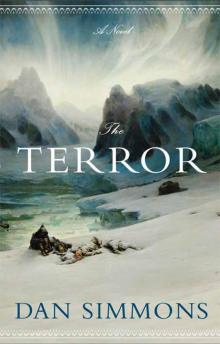 The Terror
The Terror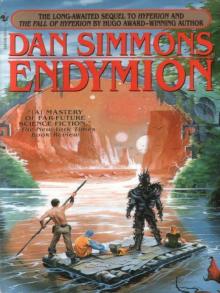 Endymion
Endymion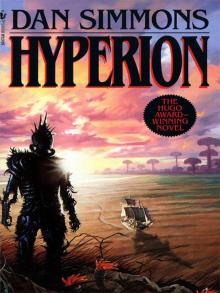 Hyperion
Hyperion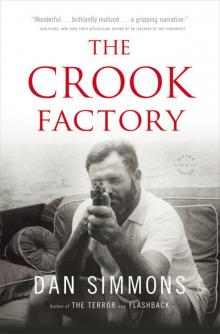 The Crook Factory
The Crook Factory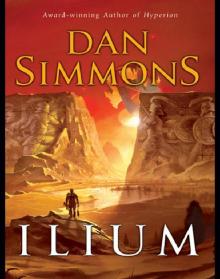 Ilium
Ilium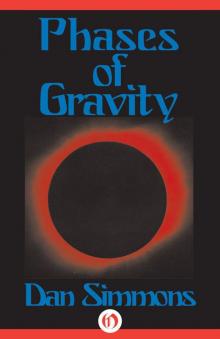 Phases of Gravity
Phases of Gravity Hardcase
Hardcase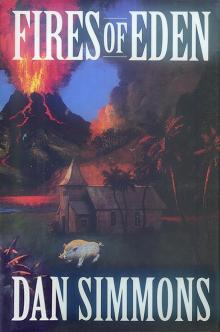 Fires of Eden
Fires of Eden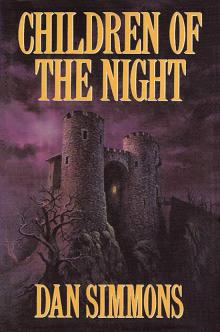 Children of the Night
Children of the Night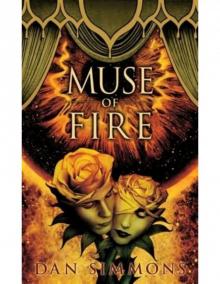 Muse of Fire
Muse of Fire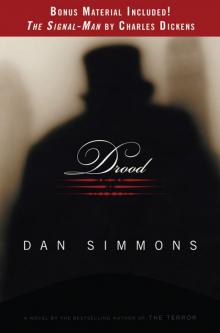 Drood
Drood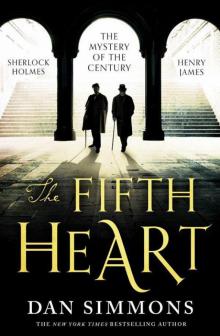 The Fifth Heart
The Fifth Heart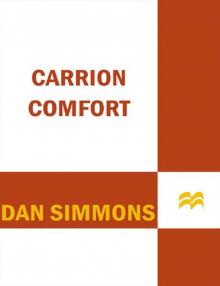 Carrion Comfort
Carrion Comfort The Hollow Man
The Hollow Man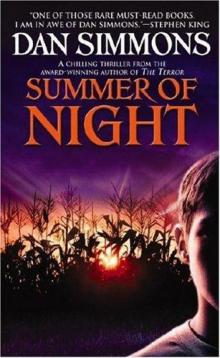 Summer of Night
Summer of Night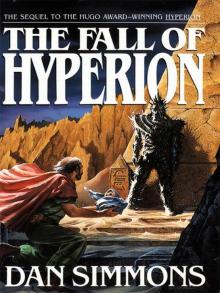 The Fall of Hyperion
The Fall of Hyperion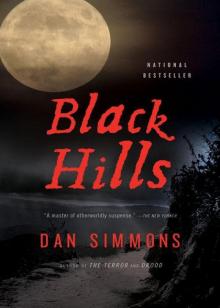 Black Hills
Black Hills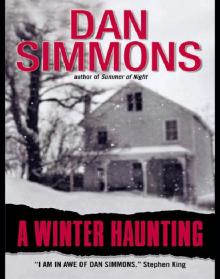 A Winter Haunting
A Winter Haunting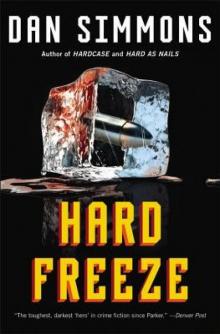 Hard Freeze
Hard Freeze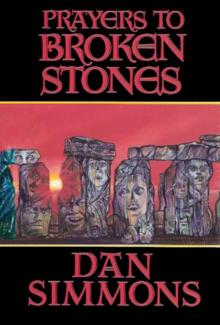 Prayers to Broken Stones
Prayers to Broken Stones Hard as Nails
Hard as Nails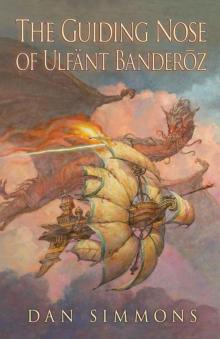 The Guiding Nose of Ulfant Banderoz
The Guiding Nose of Ulfant Banderoz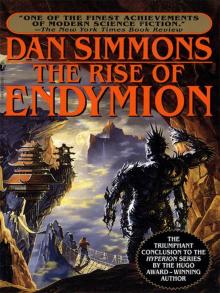 The Rise of Endymion
The Rise of Endymion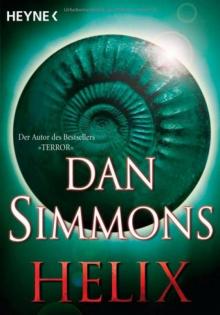 Orphans of the Helix
Orphans of the Helix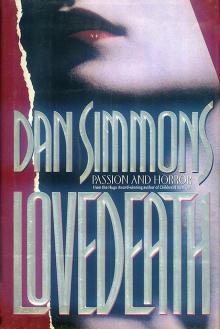 Lovedeath
Lovedeath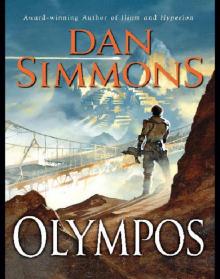 Olympos
Olympos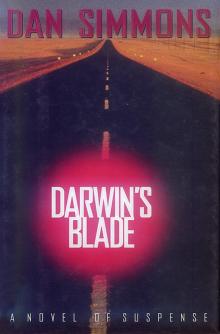 Darwin's Blade
Darwin's Blade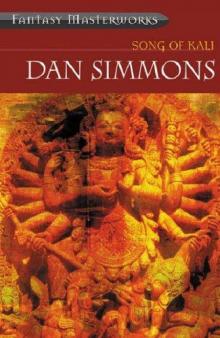 Song of Kali
Song of Kali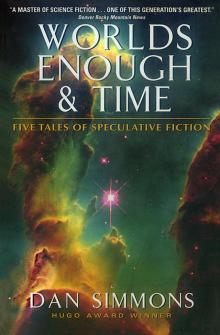 Worlds Enough & Time: Five Tales of Speculative Fiction
Worlds Enough & Time: Five Tales of Speculative Fiction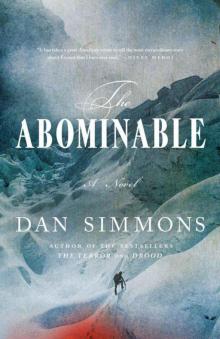 The Abominable
The Abominable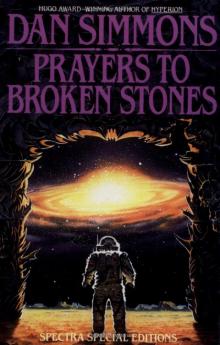 The Death of the Centaur
The Death of the Centaur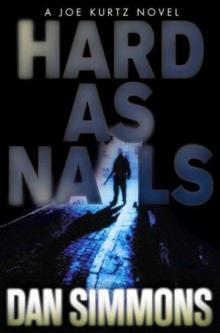 Hard as Nails jk-3
Hard as Nails jk-3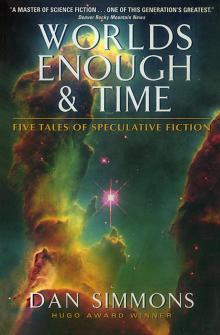 Worlds Enough & Time
Worlds Enough & Time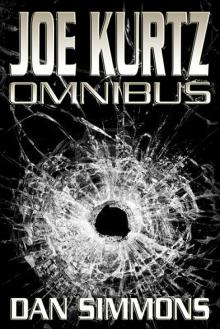 Joe Kurtz Omnibus
Joe Kurtz Omnibus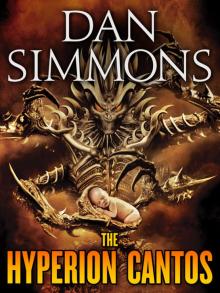 The Hyperion Cantos 4-Book Bundle
The Hyperion Cantos 4-Book Bundle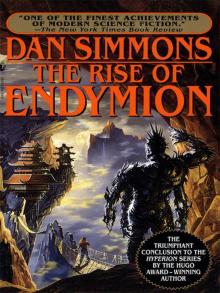 Rise of Endymion
Rise of Endymion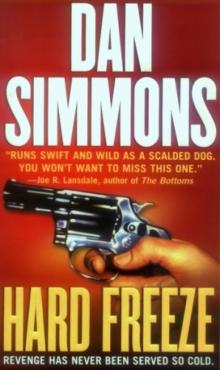 Hard Freeze jk-2
Hard Freeze jk-2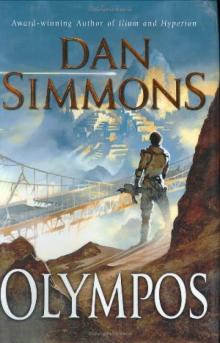 Olympos t-2
Olympos t-2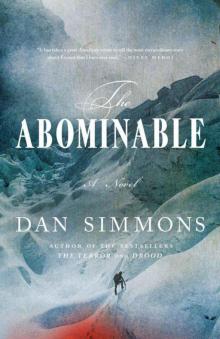 The Abominable: A Novel
The Abominable: A Novel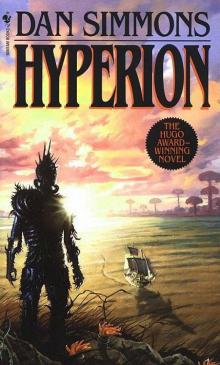 Hyperion h-1
Hyperion h-1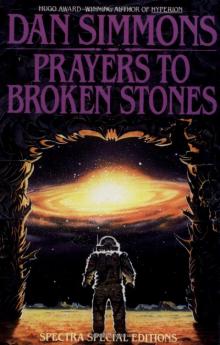 Remembering Siri
Remembering Siri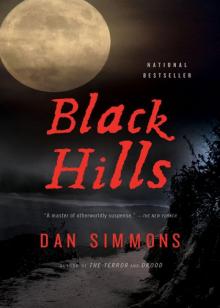 Black Hills: A Novel
Black Hills: A Novel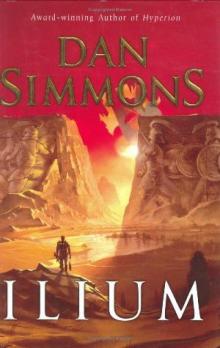 Ilium t-1
Ilium t-1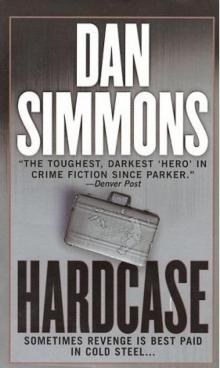 Hardcase jk-1
Hardcase jk-1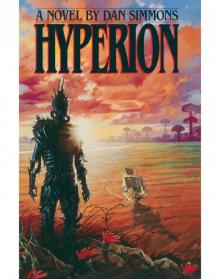 Hyperion 01 - Hyperion
Hyperion 01 - Hyperion